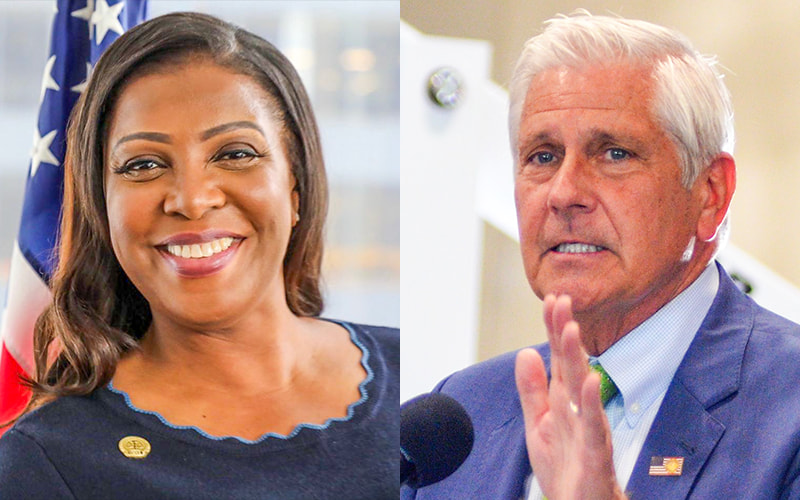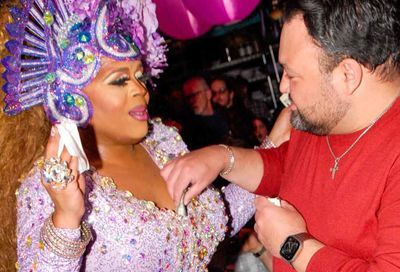California bill would ban unnecessary surgery on intersex children under age 6
Measure seeks to delay surgical interventions so parents can make better-informed decisions about children's health
By John Riley on January 30, 2021 @JRileyMW

A new bill in California would prohibit doctors from performing unnecessary genital surgeries on intersex children under the age of six.
The bill, sponsored by State Sen. Scott Wiener (D-San Francisco), would prohibit surgeries to change variations in the appearance of genitalia or other sex characteristics on intersex children under the age of six, except in extremely rare cases where it’s necessary for a child’s health.
Doctors who performs a surgery in violation of the law can be charged with professional misconduct and disciplined by the state medical board.
About 1-2% of people are born with variations in their genitalia or sex anatomy, some of whom identify as intersex.
Historically, physicians have offered to provide medically unnecessary surgeries on intersex children, such as cutting a clitoris, creating a vagina, removing hormone-making organs, or moving a working urinary opening, in order to “pick” a gender identity for them that matches their outward appearance and to allow parents to raise a child of a particular gender.
Those surgeries often result in extreme scarring, chronic pain, incontinence, post-traumatic stress disorder, and often follow-up procedures to treat health complications.
They can also result in gender dysphoria when a child is raised with the wrong gender identity based solely on their physical sex characteristics.
By waiting until a child is six years old, Wiener is hoping that parents will refrain from pursuing any surgery until they can make an informed decision, in consultation with their child and medical provider, whether to pursue surgical interventions.
A similar bill introduced during previous legislative sessions made the standard for pursuing surgery “informed consent,” which critics — including a number of medical professionals — complained was overly vague.
“The reason we chose six is because of two reasons: the parent would still make the decision to pursue surgery, but at least by the age of six, a child can communicate and express what they want and what they think,” Wiener told Metro Weekly in an interview. “And often they’ll be expressing their gender by the age of six. So the parent will be much more informed about who the child is, what the child wants, what gender the child is expressing.
“Also, if you’re a new parent and your baby is born with atypical genitalia and you’ve never dealt with it before, you can freak out. You may not know what to do, and then you might feel pressured to do what you think society expects you to do or what the doctor is recommending,” he added. “Waiting until the age of six gives the parents a few years to become more informed, to learn about the issue and to make a much more informed decision. So we think it’s a good resolution to ensure that these surgeries are not being done in a haphazard way.”
See also: Federal court orders State Department to reconsider issuing accurate passport to intersex veteran
Wiener noted that previous versions of bills to ban intersex surgeries encountered opposition from some in the medical community, including the California Medical Association.
This year, Wiener is seeking input from the CMA, hoping to get it to support the bill or suggest amendments to make it more palatable for lawmakers to pass.
“Some professionals don’t want the legislature to decide what is appropriate medical care. And I think they’re generally right, but not here, because there are exceptional situations where where we as a society say, no, these particular procedures are not acceptable,” Wiener said. “We don’t allow doctors to perform lobotomies. We don’t allow them to perform electroshock therapy. We don’t allow female genital mutilation.
“These are all illegal, not up to the doctor. And so I think that there are exceptional situations where we as a society decide that certain medical procedures are not acceptable. And these intersex baby genital surgeries should be one of them.”
Many LGBTQ advocates, particularly adults who underwent these surgeries as children, have expressed concerns about intersex surgeries and the trauma that those subjected to them can experience.
Organizations such as the United Nations, Human Rights Watch, and the World Health Organization say that these surgeries can be harmful and should only be done when an individual can participate in an informed decision.
Last year, at least two U.S. hospitals — Boston Children’s Hospital and Lurie Children’s Hospital of Chicago — agreed to stop performing intersex surgeries on infants.
Among the groups supporting the bill are the intersex advocacy group interACT: Advocates for Intersex Youth, as well as LGBTQ rights organization Equality California, the American Civil Liberties Union of California, and the National Center for Lesbian Rights.
See also: California commissioner: Trans youths cannot be denied insurance coverage for gender-affirming care
“The LGBTQ+ community — and transgender, nonbinary and intersex folks in particular — have been fighting for decades to secure our rights to make decisions about our own bodies. That fight continues today,” Rick Chavez Zbur, the executive director of Equality California. “Children born with diverse physical sex traits and their parents should be able to participate in the critically important decision-making process regarding medically unnecessary and often irreversible surgical interventions.”
“Current medical practice allows surgeons to conduct life-altering and medically unnecessary surgeries on infants with variations in their sex anatomy simply to address the anticipated discomfort of others rather than the child’s health and well-being,” Shannan Wilber, the youth policy director at the National Center for Lesbian Rights, said in a statement. “These practices perpetuate gender stereotypes and may not reflect the child’s choices when they are old enough to participate in the decision. NCLR is honored to stand with the intersex community to support their autonomy and dignity.”
Wiener insists that the bill is not intended to imply that intersex surgeries are always harmful or wrong, noting that some who have undergone such procedures as children are happy they had surgery, particularly if their external sex organs match their gender identity.
“All we’re suggesting is that the child, the person, the person whose body is going to be permanently, irreversibly changed should have some level of input into that decision, and again, some will want the surgery and some won’t, and that is totally fine,” he said. “But when you’re performing these surgeries on babies, they don’t get any input and you’re rolling the dice.
“What we have here is an extreme situation where you have decisions that are being made that are permanent and irreversible,” he added. “And the only person who has no involvement in that decision is the person whose body is being permanently changed. That’s just not tenable.”
Read more:
Oklahoma school expels girl after telling female friend she has a crush on her
Liz Cheney’s office uses tired homophobic trope to attack Matt Gaetz
Lesbian former lawmaker Heather Mizeur announces challenge to Congressman Andy Harris
53 LGBTQ Candidates Were on The Ballot Tuesday. Here’s How They Fared.
Several LGBTQ candidates either won outright or earned berths in runoff elections following the "Super Tuesday" primaries.
By John Riley on March 6, 2024 @JRileyMW
Several LGBTQ candidates were successful in yesterday's "Super Tuesday" primaries, with some winning their party's nomination and others moving on to runoff elections.
Candidates appeared on the ballot in six different states: Texas, California, Arkansas, Tennessee, Vermont, and North Carolina, with several candidates poised to become historic "firsts" should they emerge victorious in general elections later this year.
In Texas, Molly Cook, running in the Houston-based 15th State Senate District, placed second, with 21% of the vote.
Because none of the Democratic candidates in the primary reached the 50% plus one vote threshold needed to win the primary, Cook will face off against State Rep. Jarvis Johnson in a runoff election on May 28.
Letitia James Can Sue Nassau County Over Trans Ban
A federal judge will not stop the New York Attorney General from taking legal action against a county with a trans sports ban.
By John Riley on April 10, 2024 @JRileyMW
A federal judge rejected a request from New York's Nassau County to block New York Attorney General Letitia James from taking legal action against the county for its law prohibiting transgender athletes from using county-owned sports venues.
In February, Nassau County Executive Bruce Blakeman, a Republican, issued an order denying permits for all county-run parks and sports facilities to any female-designated sports team that cannot provide evidence, including original birth certificates attesting that all their members were assigned female at birth.
Days later, James, a Democrat, sent Blakeman a letter telling him to rescind the order, on the grounds that it violates New York State's law prohibiting discrimination based on sexual orientation, gender identity, or gender expression. She called the order "transphobic and blatantly illegal."
Court Blocks Texas from Investigating Trans Kids’ Families
A Texas judge blocked the Texas Attorney General's office from pursuing investigations of parents of transgender children.
By John Riley on April 1, 2024 @JRileyMW
A Texas court blocked Republican State Attorney General Ken Paxton's office from demanding information and documents from PFLAG that might reveal the identities of families seeking out gender-affirming care for transgender children.
Last week, Travis County District Court Judge Amy Clark Meachum issued a temporary injunction blocking Paxton's office from demanding the information, writing that "immediate and irreparable injury, loss, or damage will result to PFLAG and its members" if Paxton's office is able to obtain information about the group's members, which number close to 600 in Texas alone.
Support Metro Weekly’s Journalism
These are challenging times for news organizations. And yet it’s crucial we stay active and provide vital resources and information to both our local readers and the world. So won’t you please take a moment and consider supporting Metro Weekly with a membership? For as little as $5 a month, you can help ensure Metro Weekly magazine and MetroWeekly.com remain free, viable resources as we provide the best, most diverse, culturally-resonant LGBTQ coverage in both the D.C. region and around the world. Memberships come with exclusive perks and discounts, your own personal digital delivery of each week’s magazine (and an archive), access to our Member's Lounge when it launches this fall, and exclusive members-only items like Metro Weekly Membership Mugs and Tote Bags! Check out all our membership levels here and please join us today!
The Magazine
-
Most Popular
 Aaron Rodgers Suggests AIDS Was Created by U.S. Government
Aaron Rodgers Suggests AIDS Was Created by U.S. Government  School Board Cancels '30 Rock' Star's Anti-Bullying Talk
School Board Cancels '30 Rock' Star's Anti-Bullying Talk  LGBTQ Websites Could Be Sued Under Kansas Anti-Porn Law
LGBTQ Websites Could Be Sued Under Kansas Anti-Porn Law  Turning 'The Outsiders' Into a Musical Was a Mistake (Review)
Turning 'The Outsiders' Into a Musical Was a Mistake (Review)  Mississippi Man Accused of Slaughtering Ex-Boyfriend
Mississippi Man Accused of Slaughtering Ex-Boyfriend  Grindr's New Feature "Roam" Connects Users Around the Globe
Grindr's New Feature "Roam" Connects Users Around the Globe  Star Trek Discovery's Wilson Cruz Keeps Making Television History
Star Trek Discovery's Wilson Cruz Keeps Making Television History  DC Black Pride 2024: Everything You Need to Know
DC Black Pride 2024: Everything You Need to Know  Conservative Ad Makes Case for Transgender Rights
Conservative Ad Makes Case for Transgender Rights  'The Nance' at 1st Stage: Pansy Division (Review)
'The Nance' at 1st Stage: Pansy Division (Review)
 School Board Cancels '30 Rock' Star's Anti-Bullying Talk
School Board Cancels '30 Rock' Star's Anti-Bullying Talk  Aaron Rodgers Suggests AIDS Was Created by U.S. Government
Aaron Rodgers Suggests AIDS Was Created by U.S. Government  LGBTQ Websites Could Be Sued Under Kansas Anti-Porn Law
LGBTQ Websites Could Be Sued Under Kansas Anti-Porn Law  HRC's Kelley Robinson Makes the Time 100 List
HRC's Kelley Robinson Makes the Time 100 List  Grindr's New Feature "Roam" Connects Users Around the Globe
Grindr's New Feature "Roam" Connects Users Around the Globe  Kansas Governor Vetoes Trans Health Care Ban
Kansas Governor Vetoes Trans Health Care Ban  Court Blocks West Virginia Trans Athlete Ban
Court Blocks West Virginia Trans Athlete Ban  DC Black Pride 2024: Everything You Need to Know
DC Black Pride 2024: Everything You Need to Know  Conservative Ad Makes Case for Transgender Rights
Conservative Ad Makes Case for Transgender Rights  How Vending Machines Can Save Lives in Substance Abuse Crisis
How Vending Machines Can Save Lives in Substance Abuse Crisis
Scene
Metro Weekly
Washington's LGBTQ Magazine
P.O. Box 11559
Washington, DC 20008 (202) 638-6830
About Us pageFollow Us:
· Facebook
· Twitter
· Flipboard
· YouTube
· Instagram
· RSS News | RSS SceneArchives
- "We use cookies and other data collection technologies to provide the best experience for our customers. You may request that your data not be shared with third parties here: "Do Not Sell My Data
Copyright ©2024 Jansi LLC.










